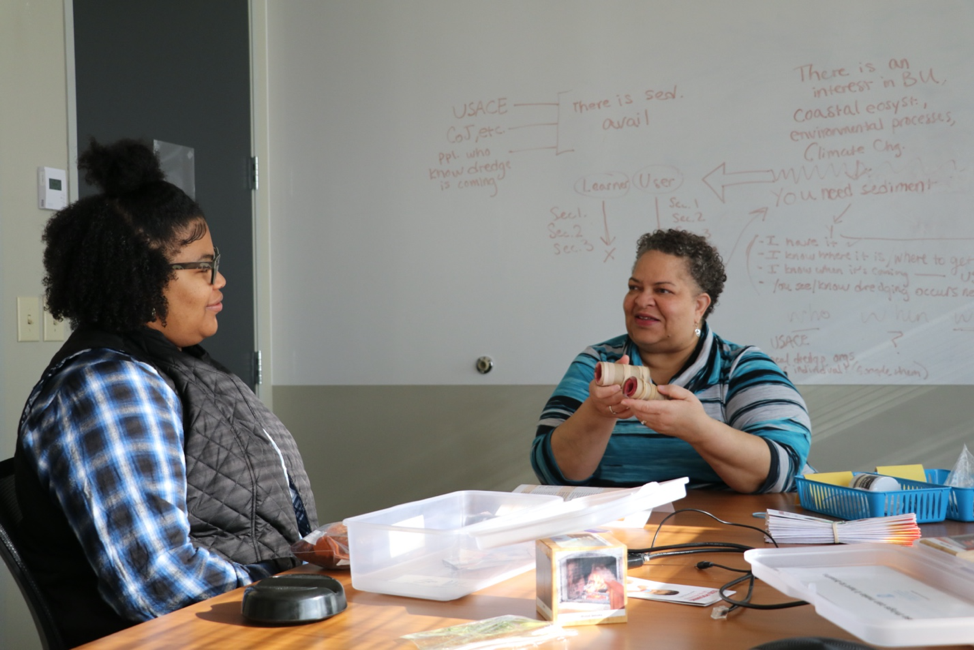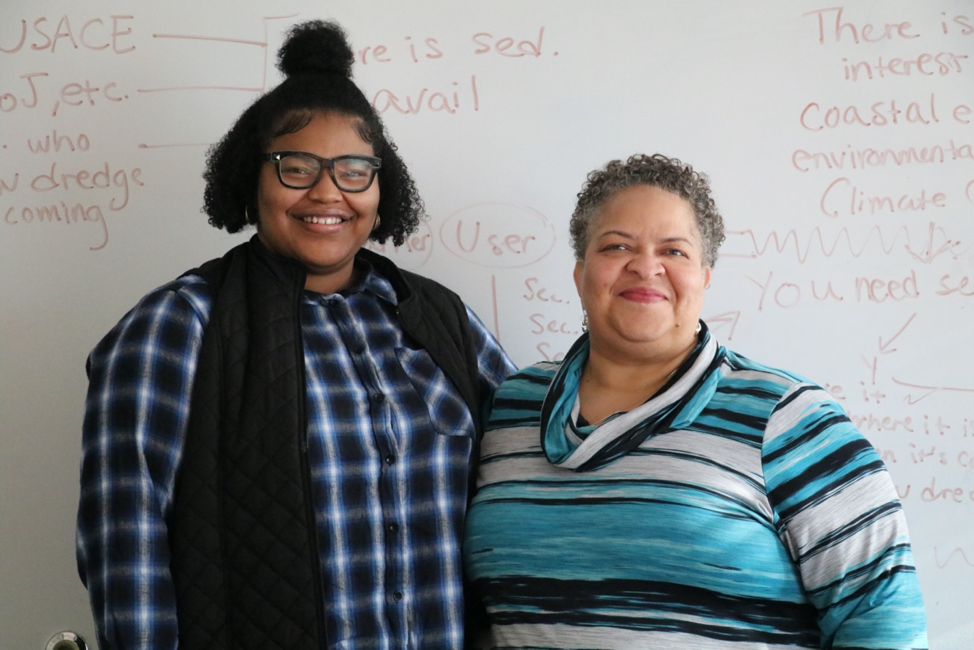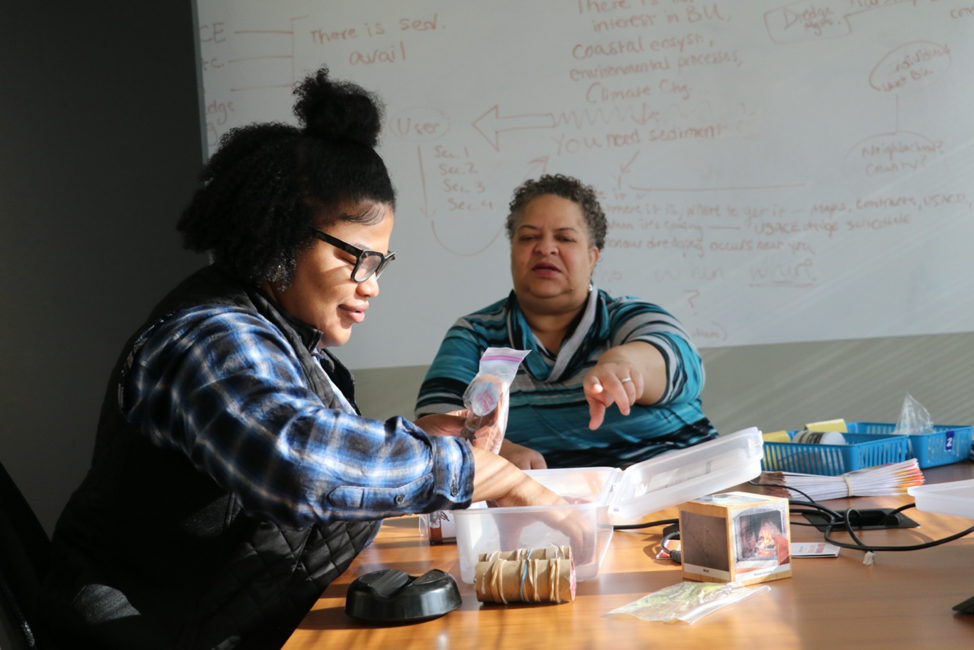The potential of mentorship, Graves and Johnson forge powerful bond
February 5, 2023
Neasha Graves enthusiastically shows a model of a human airway fashioned from a toilet paper roll, rubber bands and pink and red foam craft sheets to Mitierra Johnson. Graves is simulating a healthy airway and contrasting it with the airway of someone with asthma. Together, they are preparing educational materials to use in a training for public health professionals, featuring peer-reviewed research on environmental exposures that exacerbate asthma and strategies that professionals can use to advise asthma patients and their families about removing or reducing exposures in their homes.
Graves, an experienced environmental health educator in North Carolina, has spent the last 16 years at UNC educating public health professionals on how to prevent childhood lead poisoning and reduce other harmful environmental exposures in homes. In her role as environmental health outreach manager in the Institute’s Center for Public Engagement with Science (CPES), she coordinates environmental health programming aimed at helping professional and community audiences understand how the environment can affect human health and collaborating with community partners who serve populations most impacted by these environmental health conditions.
Johnson is just starting her career in environmental health education. She was introduced to CPES through an internship she participated in last spring. A partnership with the North Carolina Central University (NCCU) Public Health Education Department brought two interns to the Institute to work in the public health education field. Following the internship, Johnson joined CPES as an environmental health research assistant. The other intern, Kyara Crocker, accepted a position as a health educator in a county health department.
A hallmark of CPES programming is a commitment to developing the workforce of the future. Through partnerships and programming, CPES creates career opportunities in STEM fields for students and young professionals who identify as members of groups that have traditionally been underrepresented in those fields.
“I feel like we are opening doors and opening the eyes of young people to look beyond maybe that first intent they had when they started college, to think more broadly about opportunities and to know there are people in their corner who want to see them succeed,” said Graves. “Whether we are tough, whether we are fair, whether we are kind, whether we are nurturing, whatever we are to them, the goal is to build those opportunities for them.”
Johnson works on a host of projects at the Institute while she is learning and growing professionally.
“When I first started at NCCU, I was majoring in pharmaceutical sciences,” Johnson said. “But I figured out I wanted to help people in a different capacity. Prior to my internship, I had such a surface level thinking of environmental health. This experience allowed me to have more of an in-depth understanding of that and also it increased my awareness of the breadth of the environmental health field.”
Graves, among other staff at the Institute, serve as a mentor to Johnson. For Graves, being a mentor is very personal. She benefitted from having mentors in her life, but not always for the things that she wanted to pursue in a career, especially as her career took some turns.
“I would often be the only African American student in a class,” she recalled. “Sometimes you go into an event and you’re the only African American woman or woman professional, and that can be a lonely road sometimes, in terms of not seeing anyone that looks like you or has had similar experiences. I think there is an appreciation I have for wanting to see more young African American women, and women in general, seek opportunities to build their careers.”
Growing up with several family members who were teachers, Graves felt herself called to teach. She loved government and civics and decided to become a high school social studies teacher. After graduating from Meredith College, Graves taught for five years at Northwood High School in Chatham County—where she attended high school. After teaching students and encouraging them to pursue careers in government, she decided to follow her own advice and pursue a career in state government. She earned her MPA from NCCU and dove into a fellowship with the state of North Carolina’s Department of Environmental and Natural Resources (now the Department of Environmental Quality). The fellowship launched her career in environmental health education, teaching lead poisoning prevention to adults in the state.
“Teaching is in my DNA, and I never truly left it,” she said. “I remember the day I decided to quit teaching high school. I was sobbing. A man who is still my teaching mentor to this day came into the teachers’ lounge and said, ‘what’s wrong with you’ and I said, ‘I can’t do it, I can’t do graduate school and teach at the same time. I just think I am getting burned out.’ He said, ‘you don’t have to be in the classroom, but please don’t ever leave education.’ And that stuck with me for the last 25 years. I stuck to it.”
Mentors over the course of Graves’ career have had an impact that shaped who she became both personally and professionally, and she is ardently giving that experience to the next generation.
“You need that encouragement to push, and I don’t know if its luck, if it’s hard work, if it is circumstance, but the right people were in the right places at the right times for me and that has been a wonderful experience for me to look back 25 years or more and see who helped me,” Graves said.
For Johnson, growing up in Rockingham, NC, she noticed there was a lack of resources in her community, and she wanted to change that. She wasn’t exactly sure what that would look like, but with the help of mentors in her life, she is taking a path where she feels empowered to make a difference in the lives of others.
“My favorite subjects in school were science and reading, so that is my connection with the environment,” Johnson said. “A little bit of reading and science and you apply it together. I always liked to learn ‘the why’ behind things. The environment affects everyone, that’s why you should be concerned about it. I want to be part of making someone’s life better.”
In her role with CPES, Johnson enjoys getting exposure to many facets of environmental health education, from interviewing public health professionals, to creating educational materials, to getting out in the field conducting healthy homes visits with educators in local housing coalitions. She is developing her skill sets as an aspiring researcher.
“People ask me what I do for fun, and I’m like work,” she quipped. “I am increasing my knowledge and learning new things every day.”
Johnson’s drive and curiosity fuel Graves, too.
“I’ve been at UNC 16 years, but I still continue to learn,” Graves said. “That is the beauty of this job. It fosters lifelong learning, and I appreciate that.”
Mentoring partnerships are mutually beneficial to both the mentor and mentee, but they also grow the profession.
“Let’s be candid,” Graves said. “That is why we promote diversity in STEM education programming. We need to see more women and people of color in these fields, especially to engage those who are most impacted by environmental harms. How does our program grow if we don’t mentor young diverse people who are not well-represented in STEM and are seeking these opportunities? It helps us as much as it helps them.”


